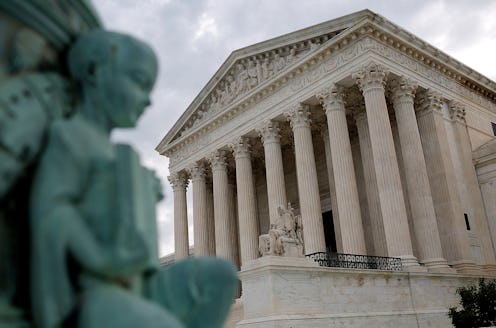News
Gorsuch Could Be On The Bench Soon

After an eventful (and controversial) first week in office, President Donald Trump announced that he's chosen Neil Gorsuch as his nominee for the Supreme Court on Jan. 31. The announcement came during an East Wing ceremony on primetime television, and was heavy on the heels of a slew of executive orders that drew the ire of Democrats and some Republicans. Now that Trump's decision is clear, the question remains: when will Gorsuch be confirmed for the Supreme Court, and what process will they have to undergo to get there?
There's no exact timeline for the confirmation of a new Supreme Court justice. Sen. Chuck Grassley, the Senate judiciary committee chair, said he expects the new justice to be confirmed and sworn in by April, but that is an optimistic figure given the potential length of the confirmation process itself.
Similarly to cabinet nominees, new Supreme Court justices must undergo confirmation hearings in the Senate. The confirmation process for Justice Sonia Sotomayor, President Obama's first pick for the court, took 10 weeks and 87 days between nomination and confirmation, and Justice Elena Kagan, Obama's second nominee, took nearly as long. Both justices received major pushback from Senate Republicans, and if this session's Democrats undergo a similar scorched-earth policy regarding Trump's nominee, it likely won't be as quick as Sen. Grassley would hope.
The death of former Justice Antonin Scalia left a vacancy on the Supreme Court bench for nearly a year since the conservative justice's death on Feb. 13, 2016. President Obama nominated Merrick Garland in March of 2016, but Senate Republicans refused to hear his confirmation, causing a 10-month-long gridlock that ultimately resulted in Trump's pick of Gorsuch for the vacant seat. The move was initially viewed as a means to add more conservative voices to the left-leaning SCOTUS in a time when nobody ever thought Trump could actually win the presidency, and Senate Democrats believe that the seat was stolen from Garland.
Senate Democrats have promised to filibuster any of Trump's picks, but the rules regarding a 60-vote majority for SCOTUS confirmation can be changed using the so-called "nuclear option," which allows the Senate majority leader to change the rules to prevent intentional gridlock. If Majority Leader Mitch McConnell enacts the "nuclear option," the Senate will only need a majority of 51 votes to confirm Gorsuch.
In a political climate as tense as the one in which Trump nominated Gorsuch, there is no surefire way to predict how long it will take them to become the next Supreme Court justice, or if they will be confirmed at all. Recent history has taught us nothing if not the power of the filibuster and intentional Congressional gridlock, but with a Republican majority in the Senate and the possibility of the "nuclear option," the chances of Gorsuch being sworn-in are very high.